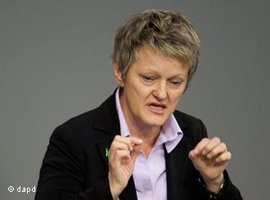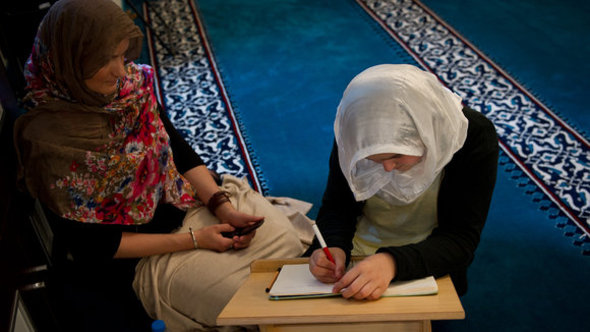Encouraging Prejudice and Paranoia
The German interior ministry is currently on the hunt for missing persons. In fact, quite a lot has gone missing from the country's security services: files about a gang of neo-Nazi killers which got lost and shredded, for example. But that's not what the ministry is looking for: the "missing" it's looking for are called Ahmed, Hassan, Fatima and Tim. Their friends can't seem to talk to them any more – they've become strange.
All four of them – the three immigrants and the young German – have in common that, in fact, they don't exist. They've emerged from the fantasy of some PR-types who've thought up a nice public relations campaign for the ministry's "Radicalisation Advice Centre". What they also have in common – at least according to the brief texts on the "missing" posters – is that they have all drifted into Islamist fundamentalism; they've been caught in the fangs of some radical preacher and their character has suffered a deep change, so that their former friends don't recognise them any more.
It's not just Muslim organisations and immigrants' associations which are up in arms about the new campaign; many people working in the integration field are also shaking their heads in disbelief: the campaign, they say, encourages prejudice and paranoia. They want it stopped.
Now, the idea of a Radicalisation Advice Centre might be a wonderful one: young people do get radicalised. They can find themselves getting sucked in by militant Islamists (something which can happen to immigrants or to German converts), or they could find themselves getting involved in neo-Nazi circles; they could even theoretically drift into radical left-wing terror groups (even if such groups are not particularly active right now, one can't assume this will always be the case). And any such radicalisation involves a change in character – the first people to become aware of the symptoms are friends and relatives.
They often do not know what to do. They feel helpless when they talk to the person. It's good if they have an advice centre they can turn to in their desperation. It's an open question as to whether it's a good idea for it to be part of the interior ministry – it won't make it easy to maintain contact with the person who's gone "missing" if you tell them you've just talked to the police about them.
Only the Muslims
But leaving that aside, the question remains: what does it tell us if the ministry's campaign assumes that it's mainly Muslims who get trapped by "religious fundamentalism"? In the case of the young German man, Tim, it's not stated explicitly, but it's fairly obvious that he has converted to Islam and got involved in fundamentalist groups. He might have drifted into some evangelical messianic sect, but scarcely anyone looking at the poster will think that.

And that itself is a scandal: the only radicalisation which is dealt with in this campaign is the Islamist variety. Neo-Nazis and Breivik-style Islamophobes, who are much more dangerous and are taking up more and more space in the Internet, are simply not addressed.
But the campaign wouldn't be better if it were, so to speak, more "balanced" and every radicalism had its own poster. With neo-Nazis or Islamophobes, it's fairly clear when they've gone radical: they start saying radical things or agreeing with radical positions. Nobody will find themselves accused of being a Breivik-fan just because he's got blond hair.
It's different with the Muslims. You can see that with the picture of the "missing" Fatima, who is wearing a head-scarf. So someone who is wearing a head-scarf can be suspected of being a dangerous radical. And when someone in the interior ministry points out that that is not what was meant at all, then the answer is: I'm pleased to hear that, but it's irrelevant, since that is exactly how it's being understood – by the Muslims who are offended by it, and by the average German who assumes it anyway. The campaign only contributes to the widespread paranoia about "the Muslims" – and thus encourages the very radicalism it wants to fight.
In addition, the term "radical" when used in connection with Islam is very inexact. What is meant by it? Jihadis or Al Qaeda fans who are in favour of violence? Or just anyone who is committed to a certain kind of religious piety.

Sniffing around the beliefs of others
One can have good reasons to be against religious piety too. If someone commits his life entirely to God, only reads the bible, the Koran or other "holy books"; if someone rejects the secular world and considers it inferior, promoting a puritan morality; if someone believes that Allah dictated the Koran word for word to Mohammed, or that Jesus will soon return; if someone tries to be a missionary for such pre-modern junk – at least from a secular standpoint (such as this author considers his own), one has every reason to criticise. One even has an obligation to do so. But as long as such people don't commit themselves to violence, there is no reason for them to be of any interest to the police.
The ministry's campaign, on the other hand, calls for people to sniff around in the beliefs of others: anyone who shows "signs" of drifting off into a religious fantasy world and doesn't let people come close to him any more should be reported. What counts as a "sign", of course, varies from person to person. And someone who carefully notes even the smallest indication – isn't he being especially responsible?
One really does not want to imagine the sort of society in which such a campaign could be successful – a society in which friends snoop on friends, and, as soon as they note a couple of "signs", are off to the police advice centre. That is the spirit of the East German secret police, the Stasi.
Robert Misik
© Qantara.de 2012
Robert Misik is a writer in Vienna and writes for the German 'tagezeitung' newspaper and the Austrian magazines, Falter and Profil. His latest book is "Politik der Paranoia. Gegen die neuen Konservativen" ("The Politics of Paranoia: Against the New Conservatives"), published by the Aufbau-Verlag publishing house.
Translated from the German by Michael Lawton
Editor: Lewis Gropp/Qantara.de
